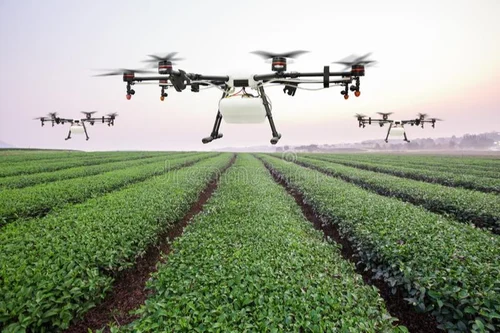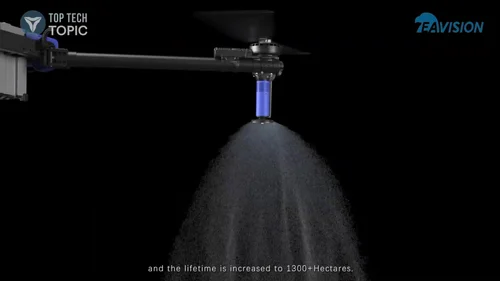1 Ltr. Agriculture Drone
₹90,000.0
| Capacity | 1 Litre |
| Material | Carbon Fiber |
| Camera Technology | Digital Camera |
| Camera Technique | RTH Mode |
| Power | 160 W (Max) |
| Color | Black |
| Spray Speed | 5 m/s |
| Wheelbase | 500 mm |
| Operation Mode | Manual |
| Air Vehicle Category | Small |
| Spraying Width | 4-5 meter |
- Description
- Additional information
- Reviews (0)
- Q & A
- Sustainability Remark
- More Offers
- Store Policies
- Inquiries
- Automatic line-feeding spray (recyclable spraying)
- Automatic flight spraying at point AB (plant protection aircraft can fly autonomously and record automatically after spraying)
- Fully autonomous spraying of plots (the area and terrain of the selected plots of the ground station are determined, and the aircraft can be autonomously sprayed)
- One-click record of medicine break point (automatically record the main point after pesticide spraying in the spraying process and return to take-off point to change medicine)
- One-click return to the medicine break point (after spraying pesticides, the main points are automatically recorded after spraying, and then return to the take-off point to change the coloring medicine. After changing the medicine, the machine will automatically return to the medicine break-off point. spray)
| brands | DJI |
|---|
You must be logged in to post a review.
Q & A
Sensors play a crucial role in modern agricultural farming by providing real-time data and insights to optimize various aspects of crop production. The sustainability of sensors in agricultural farming depends on several factors:
Energy Efficiency: Sustainable sensors for agricultural farming should be designed to consume minimal energy. Low-power sensors or those powered by renewable energy sources, such as solar or wind, can minimize their environmental impact and reduce the reliance on non-renewable resources.
Longevity and Durability: Sensors need to be built to withstand harsh environmental conditions and have a long lifespan. Durable sensors require fewer replacements, resulting in reduced waste generation and lower environmental impact.
Material Selection: Sustainable sensors should be constructed using environmentally friendly materials. Choosing materials with low environmental impact, such as recycled plastics or bio-based alternatives, can reduce the carbon footprint and waste associated with sensor production.
Data Optimization: Sensors generate large amounts of data, and efficient data management is crucial to ensure sustainability. Optimizing data collection, storage, and processing can reduce energy consumption and the need for additional resources.
Precision and Efficiency: Sensors enable precise monitoring and control of various parameters in agricultural systems. By providing accurate information about soil moisture, temperature, nutrient levels, and crop health, farmers can optimize resource usage, such as water and fertilizers, resulting in increased efficiency and reduced environmental impact.
Integration with Farming Practices: For sensors to be sustainable, they should be integrated into existing farming practices effectively. Farmers need to understand the data provided by sensors and be able to translate it into actionable decisions that promote sustainable farming practices.
Overall, the sustainability of sensors for agricultural farming depends on factors like energy efficiency, durability, material selection, data optimization, precision, efficiency, and integration with farming practices. By considering these aspects, farmers can leverage sensor technologies to improve sustainability and make more informed decisions in their farming operations.
General Inquiries
There are no inquiries yet.






Reviews
There are no reviews yet.